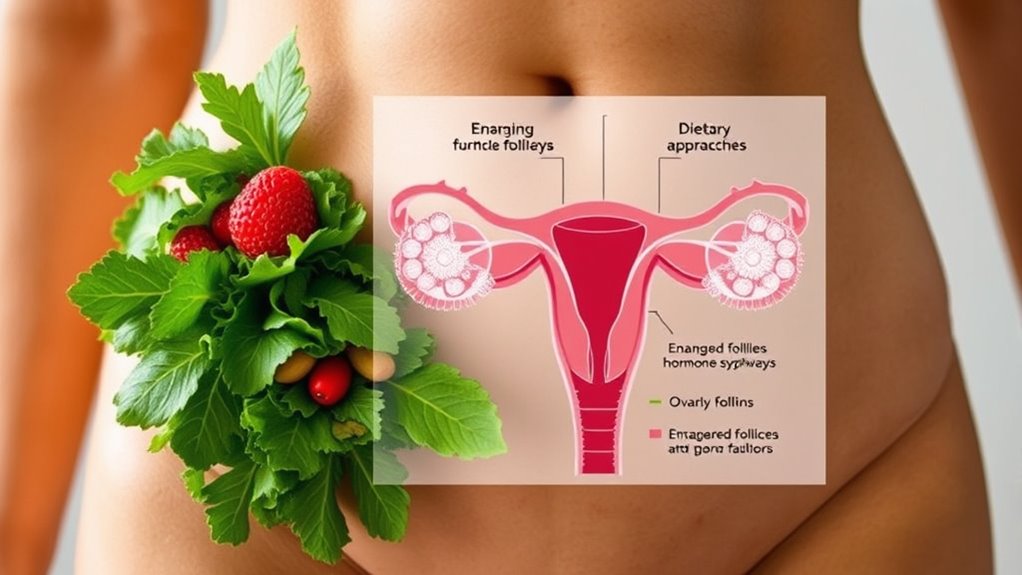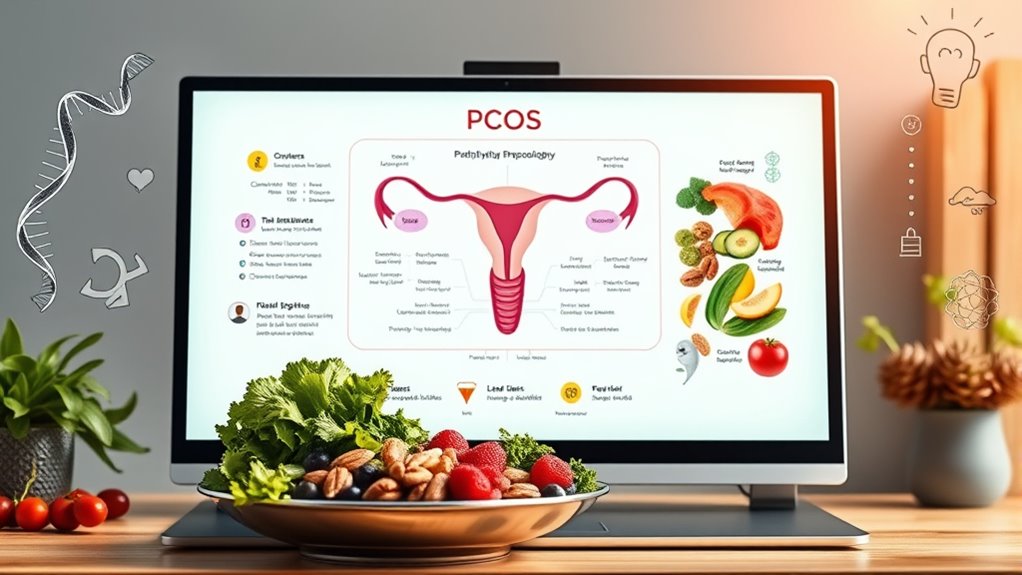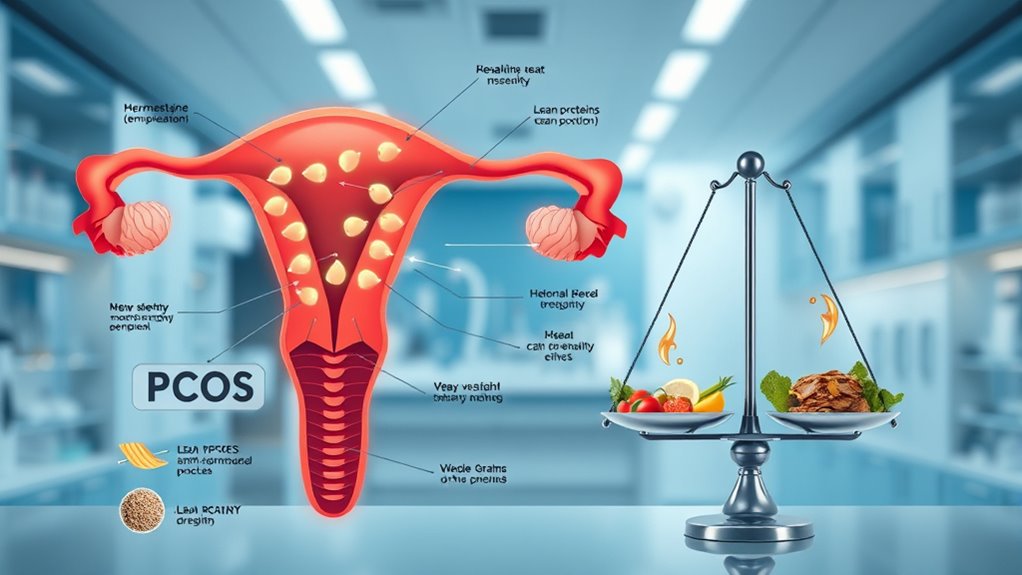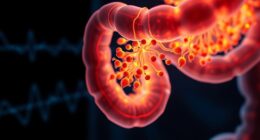PCOS occurs when hormonal imbalances and insulin resistance disrupt your ovarian function, leading to irregular periods, high androgen levels, and symptoms like acne and hirsutism. Poor lifestyle choices and environmental toxins can worsen these issues. Adopting a balanced diet rich in fiber, healthy fats, lean proteins, and anti-inflammatory foods helps support hormonal balance and insulin sensitivity. To better understand how these factors interconnect and how to manage them effectively, continue exploring this essential topic.
Key Takeaways
- Hormonal imbalances in PCOS involve elevated androgens and decreased progesterone, disrupting ovulation and menstrual cycles.
- Insulin resistance is central to PCOS, worsening hormonal disruption and metabolic symptoms, which can be improved with lifestyle changes.
- Anti-inflammatory, blood sugar-regulating diets rich in fiber, healthy fats, and lean proteins support hormonal balance.
- Avoiding processed carbs and sugary foods helps prevent insulin spikes that exacerbate PCOS symptoms.
- Lifestyle modifications, including stress management and proper nutrition, influence gene expression and improve ovarian function.
Understanding the Hormonal Imbalances in PCOS

Understanding the hormonal imbalances in PCOS is essential because these disruptions drive many of the condition’s symptoms. You’ll notice hormonal fluctuations that affect your reproductive system and overall health. These imbalances originate from disrupted endocrine signaling, which normally regulates hormone production and balance. In PCOS, your ovaries produce excess androgens, male hormones that interfere with ovulation and cause symptoms like irregular periods and acne. Meanwhile, decreased levels of hormones like progesterone further disturb your cycle. The endocrine signaling pathways that control hormone release become impaired, creating a cascade of hormonal shifts. Recognizing these fundamental disruptions helps you understand why symptoms manifest and underscores the importance of addressing hormonal balance in managing PCOS effectively. Additionally, understanding flat iron bike technologies can shed light on innovative approaches to energy management and efficiency, emphasizing the importance of balance and optimization in complex systems. Moreover, focusing on hormonal regulation through diet and lifestyle changes can support your body’s natural regulation processes and alleviate symptoms. Maintaining a balanced diet with proper nutrients can influence hormonal signaling pathways and improve overall hormonal health.
The Role of Insulin Resistance and Metabolic Dysfunction

Insulin resistance plays a central role in the development and progression of PCOS by disrupting normal metabolic processes. When your body becomes less responsive to insulin, your pancreas produces more, leading to elevated insulin levels. This impairs insulin signaling, which affects how your body manages glucose and fats. As a result, you’re at higher risk of developing metabolic syndrome, a cluster of conditions like increased blood pressure, high blood sugar, and abnormal cholesterol levels. These metabolic dysfunctions can worsen PCOS symptoms and contribute to long-term health issues. Addressing insulin resistance through diet, exercise, and lifestyle changes can improve insulin signaling, reduce metabolic syndrome risk, and help manage PCOS more effectively.
How Ovarian Dysfunction Contributes to Symptoms

Ovarian dysfunction is a key factor behind many of the hallmark symptoms of PCOS, disrupting normal hormone production and ovulation. When your ovaries don’t function properly, they often develop ovarian cysts, which are fluid-filled sacs that can interfere with regular ovulation. These cysts form because hormonal imbalances cause your ovaries to produce excess androgens and irregular eggs. Over time, ovarian aging can exacerbate these issues, reducing the ovaries’ ability to respond to hormonal signals. This dysfunction leads to missed or irregular periods, infertility, and increased androgen levels, which cause symptoms like hirsutism and acne. Recognizing how hormonal imbalances contribute to ovarian dysfunction can help guide targeted treatments and lifestyle changes. By understanding how ovarian issues contribute to PCOS symptoms, you can better target treatments and lifestyle changes to improve ovarian health and overall well-being.
Genetic and Environmental Factors Influencing PCOS

Your genes can increase your risk of developing PCOS, making it partly hereditary. Environmental factors like diet, stress, and exposure to toxins can also disrupt hormone balance. Additionally, lifestyle choices may influence how your genes express themselves, affecting your overall risk. Understanding home theatre projectors and their features can provide insight into how external factors influence systems, similar to how hormonal regulation in PCOS can be affected by environmental influences. Recognizing the impact of genetic predisposition helps clarify individual susceptibility to hormonal imbalances.
Genetic Predisposition Factors
Research indicates that genetic factors play a significant role in the development of PCOS, with multiple genes linked to its manifestation. If you have a family history of PCOS, you might notice familial patterns that suggest inherited traits. Genetic testing can help identify specific gene variants associated with increased risk, providing insight into your predisposition. These genetic factors influence how your body responds to insulin and hormone regulation, contributing to PCOS symptoms. While genetics set the stage, they don’t determine your fate entirely, but understanding your genetic background can guide personalized management strategies. Recognizing the hereditary aspect empowers you to make informed lifestyle choices and seek early intervention if needed. Additionally, understanding AI security vulnerabilities can help inform future research into genetic data privacy and ethical considerations. Moreover, ongoing research into genetic markers continues to improve our understanding of PCOS and its complex causes.
Environmental Triggers Impacting Hormones
Environmental triggers can markedly influence hormone regulation and may exacerbate PCOS symptoms, especially when combined with genetic predispositions. Pollution exposure introduces harmful substances into your body that can disrupt endocrine function, affecting hormone balance. Endocrine disruptors found in plastics, pesticides, and other pollutants interfere with hormone production and regulation, potentially worsening insulin resistance and ovarian function. These environmental factors can increase inflammation and oxidative stress, further impairing hormonal health. While genetics set the stage, exposure to pollutants and endocrine disruptors acts as a catalyst, amplifying symptoms like irregular periods, excessive hair growth, and hormonal imbalances. Recognizing these triggers helps you understand the importance of reducing exposure to environmental toxins as part of managing PCOS symptoms. Additionally, affordable testing options can help identify specific environmental factors affecting your health. For example, minimizing contact with Endocrine disruptors can significantly improve hormonal balance and overall well-being. Being aware of how hormonal disruption occurs from environmental sources underscores the importance of lifestyle adjustments to support hormonal health.
Lifestyle Influences on Genes
Genetic predispositions and lifestyle choices together shape the development and severity of PCOS. Your genes set a foundation, but lifestyle factors can influence how these genes are expressed through epigenetic modifications. For instance, poor diet, stress, and inactivity can trigger changes that worsen symptoms. Conversely, targeted lifestyle interventions like balanced nutrition, regular exercise, and stress management can positively affect gene expression, potentially reducing PCOS severity. These epigenetic modifications don’t alter your DNA sequence but impact how genes function, highlighting the importance of environmental influences. Additionally, home organization can play a role in supporting healthy habits by reducing stress and creating a conducive environment for wellness. Proper stress management techniques can further influence gene expression in a beneficial way. Research shows that dietary choices can directly impact epigenetic markers, which further underscores the power of nutrition in managing PCOS. Moreover, healthy habits such as maintaining a consistent sleep schedule and avoiding toxins can also contribute to favorable gene expression changes. By adopting healthier habits, you can influence your genetic expression and manage PCOS more effectively. This interplay emphasizes that lifestyle choices are a powerful tool in shaping your health outcomes related to PCOS.
Dietary Strategies to Support Hormonal Balance

Achieving hormonal balance in PCOS often starts with targeted dietary strategies that help regulate insulin levels and reduce inflammation. Focus on balanced meals rich in fiber, healthy fats, and lean proteins to support hormonal support. Incorporate dietary supplements like omega-3s, vitamin D, and magnesium to further aid hormonal regulation. These nutrients can help reduce inflammation and improve insulin sensitivity. To stay engaged, consider this quick overview: Attention to maintaining consistency in your dietary habits can greatly enhance the effectiveness of these strategies. Additionally, understanding the role of nutrient absorption can optimize how these beneficial compounds are utilized by your body. Recognizing the importance of gut health may also play a role in supporting hormonal balance.
Practical Nutritional Tips for Managing PCOS Symptoms

To manage PCOS symptoms effectively, focus on balancing your blood sugar levels by choosing foods that prevent spikes. Incorporate anti-inflammatory foods like berries and leafy greens to reduce inflammation, which can worsen symptoms. Prioritize whole grains over refined carbs to support steady energy and hormonal stability. Additionally, maintaining a balanced diet that includes nutritional balance can help in managing the hormonal fluctuations associated with PCOS. Using airless paint sprayers can provide a smooth and efficient painting experience, especially for large surfaces or detailed projects. Understanding AI bifurcation and its societal implications can also inform long-term health and technological decisions.
Balance Blood Sugar
Balancing blood sugar levels is essential for managing PCOS symptoms, as fluctuations can trigger insulin spikes that worsen hormonal imbalances. When your blood sugar spikes, your body releases more insulin to lower it, which can lead to increased androgen production, exacerbating symptoms like acne and irregular periods. To support hormone regulation, focus on eating foods that stabilize blood sugar, such as fiber-rich vegetables, lean proteins, and healthy fats. Avoid processed carbs and sugary snacks that cause rapid blood sugar rises. Regular meals and balanced portions help prevent dips and spikes. By maintaining steady blood sugar levels, you promote better hormone balance, reduce insulin resistance, and improve overall symptom management. Consistent blood sugar control is a key step toward restoring hormonal harmony in PCOS.
Emphasize Anti-Inflammatory Foods
Incorporating anti-inflammatory foods into your diet can considerably help manage PCOS symptoms by reducing chronic inflammation that worsens hormonal imbalances. Focus on including foods rich in anti-inflammatory herbs and Omega 3 sources, which help calm inflammation and support hormonal health. Eating a variety of these foods can improve your overall well-being and alleviate symptoms like insulin resistance and irregular cycles. Incorporate fatty fish like salmon, mackerel, or sardines to boost Omega 3 intake. Add turmeric and ginger to your meals for their potent anti-inflammatory effects. Include leafy greens, berries, and nuts for antioxidants that fight inflammation. Remember, small consistent changes can make a big difference in managing PCOS symptoms effectively.
Prioritize Whole Grains
Choosing the right whole grains can considerably improve blood sugar regulation and support hormonal balance in managing PCOS. Whole grains like oats, quinoa, and brown rice are rich in dietary fiber, which slows digestion and prevents blood sugar spikes. Incorporating more whole grains into your diet helps stabilize insulin levels, reducing symptoms like irregular periods and excess androgen production. Aim to replace refined grains with these nutrient-dense options to maximize their benefits. The high dietary fiber content also promotes satiety, helping with weight management—a vital aspect of PCOS care. Remember, consistency is key. Gradually introduce whole grains into your meals, and pair them with protein or healthy fats for ideal blood sugar control. Prioritizing whole grains is a simple yet powerful step toward better hormonal health.
Frequently Asked Questions
Can Lifestyle Changes Fully Reverse PCOS Symptoms?
You might wonder if lifestyle changes can fully reverse PCOS symptoms. While they can markedly improve insulin resistance and help with weight management, they may not completely eliminate all symptoms. Adopting a healthy diet, regular exercise, and stress reduction can reduce their severity, but some women may still experience persistent issues. It’s essential to work with your healthcare provider to develop a personalized plan for managing PCOS effectively.
Are There Specific Foods to Avoid With PCOS?
Think of your body as a delicate garden; certain foods act like weeds that hinder growth. You should avoid foods to avoid that trigger inflammation and insulin spikes, such as processed snacks, sugary drinks, and refined carbs. These dietary triggers can worsen PCOS symptoms. By removing these from your diet, you’re nurturing your garden, helping your body flourish naturally and reducing symptoms without relying solely on medication.
How Does Stress Impact PCOS Severity?
Stress management plays a pivotal role in controlling PCOS severity because stress can trigger hormonal fluctuations that worsen symptoms. When you’re stressed, your body releases cortisol, which disrupts your hormones and can lead to irregular cycles and increased insulin resistance. By actively managing stress through relaxation techniques, exercise, or mindfulness, you help stabilize hormonal fluctuations, potentially reducing symptom severity and improving your overall well-being with PCOS.
Is PCOS Linked to Long-Term Health Risks?
You should know that PCOS is linked to long-term health risks, mainly because of hormonal fluctuations and insulin resistance. These factors can increase your risk of developing type 2 diabetes, heart disease, and even endometrial cancer over time. Managing these issues early can help reduce risks, so staying informed and working with your healthcare provider is key to maintaining your long-term health and well-being.
Can Natural Supplements Improve Hormonal Balance?
You might wonder if natural supplements can improve hormonal balance. Herbal remedies and nutritional supplements are popular options that some find helpful. They may support hormonal health by reducing symptoms like irregular cycles or excess hair. However, results vary, and it is crucial to consult with your healthcare provider before starting any new supplement. While they can be beneficial, they shouldn’t replace medical treatment but can complement your overall management plan.
Conclusion
Think of your body as a finely tuned garden, where hormones are the delicate flowers and insulin resistance is like pesky weeds stealing nutrients. By choosing the right dietary tools, you can nurture your garden back to health, letting your flowers bloom freely. With patience and care, you’ll transform chaos into harmony, creating a vibrant, balanced landscape where symptoms diminish and wellness flourishes—your personal oasis of health awaits your nurturing touch.









